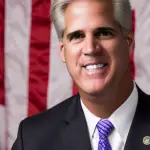The Fiscal Responsibility Act, a legislative compromise reached between President Joe Biden and House Speaker Kevin McCarthy, has caused a division among fiscally conservative non-profit organizations advocating for reduced federal spending in Washington, D.C. While the bill incorporates various spending cuts and policy measures demanded by conservatives, some of these fiscally conservative groups oppose its approval, arguing that it falls short of their expectations.
Conservative World Fractures Over McCarthy’s Debt Limit Deal via @DailyCaller https://t.co/N6klOe2br9
— Chris ?? (@Chris_1791) May 31, 2023
The Club for Growth has voiced its criticism of the bill, asserting that it perpetuates a fiscal crisis resulting from the unsustainable national debt and urging members of Congress to vote against it. Similarly, Kevin Roberts, the president of the Heritage Foundation, has criticized the bill for not addressing Biden’s allocation of funds for 87,000 new IRS agents and abandoning the $132 billion in cuts promised by the Limit, Save, Grow Act. On the other hand, Americans for Tax Reform, an anti-tax group, has urged Congress to promptly pass the bill, emphasizing that it represents a significant step in the right direction and does not include any tax increases or leftist priorities.
Heritage Action opposes the Fiscal Responsibility Act & will include a “key vote” against it on its scorecard –“a metric of conservatism that holds weight with many Republican members of Congress, campaign donors & voters.”@emilybrooksnews for @thehill⬇https://t.co/HevcL8ZBls
— Heritage Action (@Heritage_Action) May 31, 2023
According to the Congressional Budget Office (CBO), the Fiscal Responsibility Act is projected to decrease federal budget deficits by $1.5 trillion over the next ten years, making it the “largest spending cut in history,” as highlighted by House Speaker Kevin McCarthy. However, certain provisions within the bill would increase spending, such as the implementation of new work requirements for SNAP food stamps, which the CBO estimates will incur an additional cost of $2.1 billion for enforcement.
In general, the Fiscal Responsibility Act represents a positive step forward, although it falls short of fully addressing the need to restrict federal spending. Its passage is crucial in order to avert a potential debt default that could occur as early as June 5th and to allow for unrestricted borrowing until January 1, 2025. Opposing conservative groups should recognize that this legislation is a reasonable compromise, including numerous cuts to public spending and policy measures that align with conservative principles. Additionally, it is essential for Democrats to secure support from their members, necessitating bipartisan cooperation to safeguard the nation’s financial future.




